虚拟语气讲解和练习(附答案)
- 格式:doc
- 大小:117.00 KB
- 文档页数:14
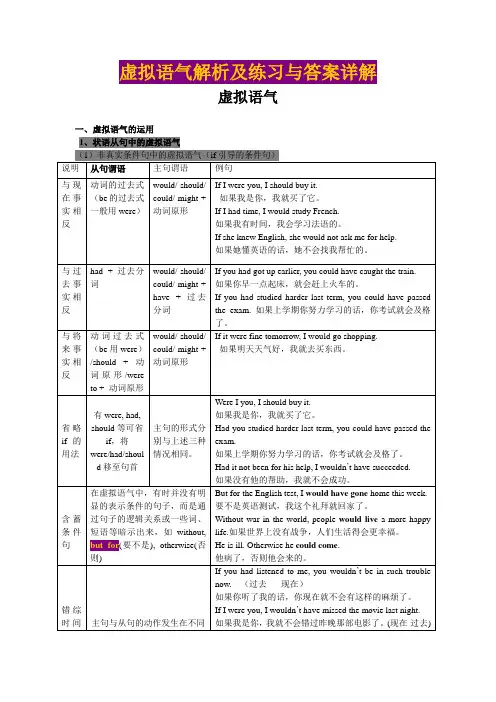
虚拟语气解析及练习与答案详解虚拟语气一、虚拟语气的运用练习题及答案解释The millions of calculations involved, had they been done by hand,______all practical value by the time they were finished.A.could loseB. would have lostC. might loseD. ought to have lost解析:这个句子中含有一个省略if,把助动词提前到主语they之前的虚拟条件句,该条件句表示对过去情况的假设,而主句中by the time they were finished表明主句也应该是对过去发生的情况的假设,因而应该选(B)would have lost为正确答案。
2. Had Paul received six more votes in the last election, he our chairman now.A. must have beenB. would have beenC. wereD. would be解析:这道题目是一个混合虚拟语气的句子。
条件句省略了if,把助词had提前到主语前面,表示对过去情况的假设,而主句中now表明了对现在情况的假设,所以应选would(should, could, might)+动词原形这种表达形式。
四个选项中只有(D)是正确表达形式,故为正确答案。
3. If you Jerry Brown until recently, you’d think the photograph on the right was strange.A. shouldn’t contactB. didn’t contactC. weren’t to contactD. hadn’t contacted解析:until recently,因此(D)是正确答案,而主句是隐含的对现在情况的假设,该句是一个混合虚拟条件句。
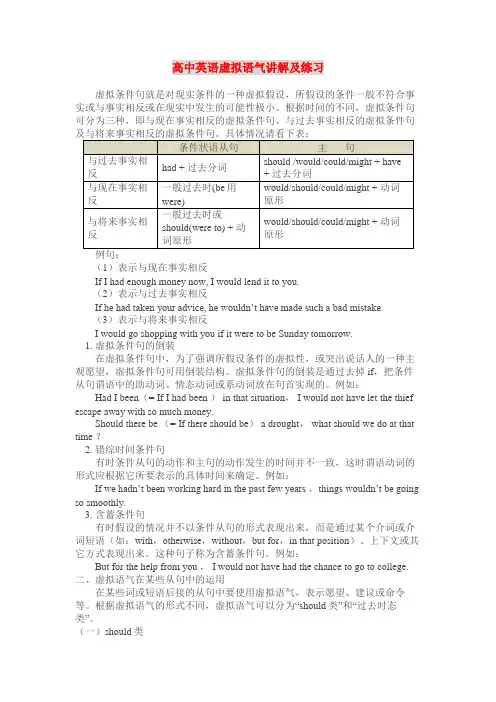
高中英语虚拟语气讲解及练习虚拟条件句就是对现实条件的一种虚拟假设,所假设的条件一般不符合事实或与事实相反或在现实中发生的可能性极小。
根据时间的不同,虚拟条件句可分为三种,即与现在事实相反的虚拟条件句、与过去事实相反的虚拟条件句(1)表示与现在事实相反If I had enough money now, I would lend it to you.(2)表示与过去事实相反If he had taken your advice, he wouldn’t have made such a bad mistake.(3)表示与将来事实相反I would go shopping with you if it were to be Sunday tomorrow.1. 虚拟条件句的倒装在虚拟条件句中,为了强调所假设条件的虚拟性,或突出说话人的一种主观愿望,虚拟条件句可用倒装结构。
虚拟条件句的倒装是通过去掉if,把条件从句谓语中的助动词、情态动词或系动词放在句首实现的。
例如:Had I been(= If I had been ) in that situation, I would not have let the thief escape away with so much money.Should there be (= If there should be) a drought, what should we do at that time ?2. 错综时间条件句有时条件从句的动作和主句的动作发生的时间并不一致,这时谓语动词的形式应根据它所要表示的具体时间来确定。
例如:If we hadn’t been working hard in the past few years ,thing s wouldn’t be going so smoothly.3. 含蓄条件句有时假设的情况并不以条件从句的形式表现出来,而是通过某个介词或介词短语(如:with,otherwise,without,but for,in that position)、上下文或其它方式表现出来。
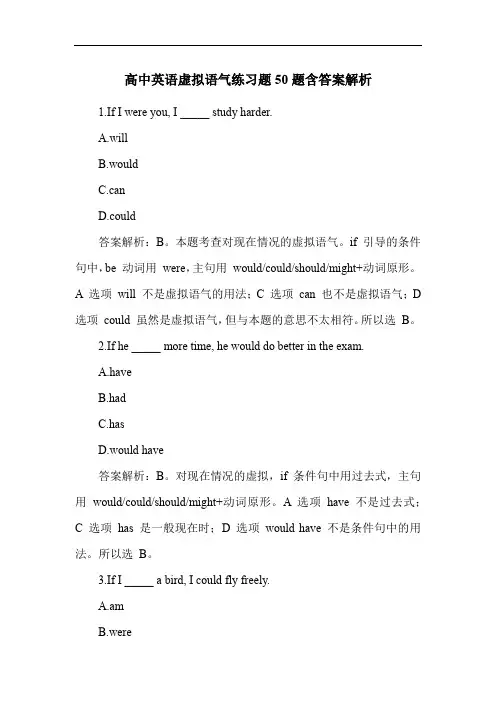
高中英语虚拟语气练习题50题含答案解析1.If I were you, I _____ study harder.A.willB.wouldC.canD.could答案解析:B。
本题考查对现在情况的虚拟语气。
if 引导的条件句中,be 动词用were,主句用would/could/should/might+动词原形。
A 选项will 不是虚拟语气的用法;C 选项can 也不是虚拟语气;D 选项could 虽然是虚拟语气,但与本题的意思不太相符。
所以选B。
2.If he _____ more time, he would do better in the exam.A.haveB.hadC.hasD.would have答案解析:B。
对现在情况的虚拟,if 条件句中用过去式,主句用would/could/should/might+动词原形。
A 选项have 不是过去式;C 选项has 是一般现在时;D 选项would have 不是条件句中的用法。
所以选B。
3.If I _____ a bird, I could fly freely.A.amB.wereC.wasD.be答案解析:B。
虚拟语气中,be 动词统一用were。
A 选项am 是一般现在时;C 选项was 一般过去时,但虚拟语气不用was;D 选项be 不是完整的动词形式。
所以选B。
4.If she _____ taller, she could play basketball better.A.isB.wasC.wereD.be答案解析:C。
对现在情况的虚拟,be 动词用were。
A 选项is 一般现在时;B 选项was 不是虚拟语气的正确用法;D 选项be 不是完整的动词形式。
所以选C。
5.If they _____ more careful, they wouldn't make so many mistakes.A.wereB.areC.wasD.be答案解析:A。
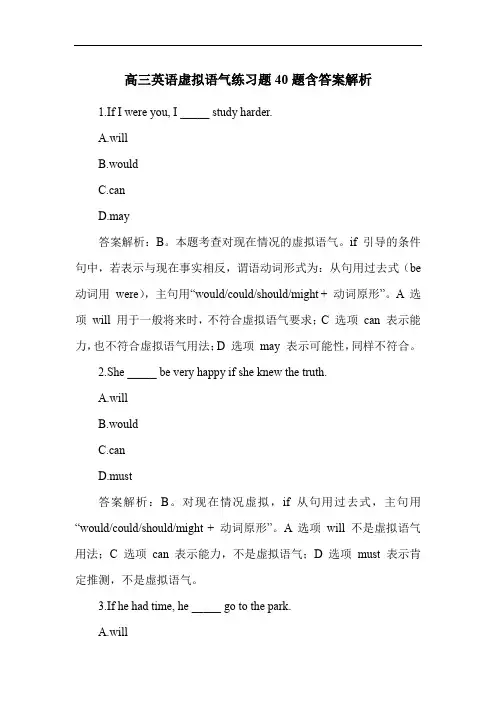
高三英语虚拟语气练习题40题含答案解析1.If I were you, I _____ study harder.A.willB.wouldC.canD.may答案解析:B。
本题考查对现在情况的虚拟语气。
if 引导的条件句中,若表示与现在事实相反,谓语动词形式为:从句用过去式(be 动词用were),主句用“would/could/should/might + 动词原形”。
A 选项will 用于一般将来时,不符合虚拟语气要求;C 选项can 表示能力,也不符合虚拟语气用法;D 选项may 表示可能性,同样不符合。
2.She _____ be very happy if she knew the truth.A.willB.wouldC.canD.must答案解析:B。
对现在情况虚拟,if 从句用过去式,主句用“would/could/should/might + 动词原形”。
A 选项will 不是虚拟语气用法;C 选项can 表示能力,不是虚拟语气;D 选项must 表示肯定推测,不是虚拟语气。
3.If he had time, he _____ go to the park.A.willB.wouldC.canD.may答案解析:B。
对现在情况虚拟,主句用“would/could/should/might + 动词原形”。
A 选项will 不是虚拟语气;C 选项can 表示能力,不是虚拟语气;D 选项may 表示可能性,不是虚拟语气。
4.I _____ buy a new car if I had enough money.A.willB.wouldC.canD.may答案解析:B。
对现在情况虚拟,主句用“would/could/should/might + 动词原形”。
A 选项will 不是虚拟语气;C 选项can 表示能力,不是虚拟语气;D 选项may 表示可能性,不是虚拟语气。
5.If they _____ here now, they could help us.A.areB.wereC.will beD.would be答案解析:B。
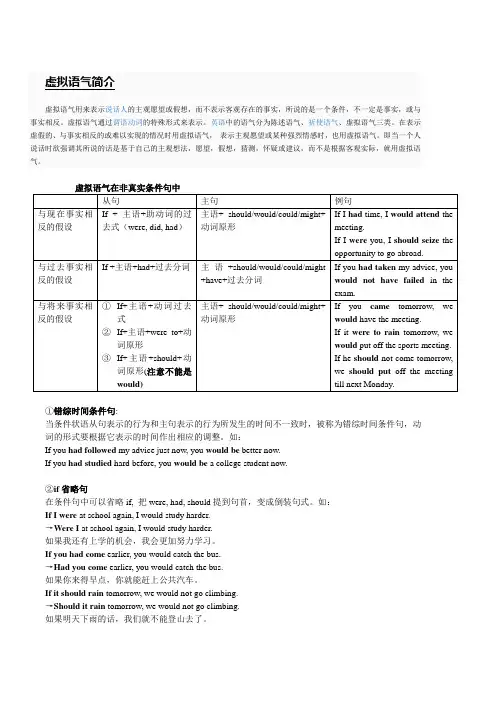
虚拟语气简介虚拟语气用来表示说话人的主观愿望或假想,而不表示客观存在的事实,所说的是一个条件,不一定是事实,或与事实相反。
虚拟语气通过谓语动词的特殊形式来表示。
英语中的语气分为陈述语气、祈使语气、虚拟语气三类。
在表示虚假的、与事实相反的或难以实现的情况时用虚拟语气,表示主观愿望或某种强烈情感时,也用虚拟语气。
即当一个人说话时欲强调其所说的话是基于自己的主观想法,愿望,假想,猜测,怀疑或建议,而不是根据客观实际,就用虚拟语气。
①错综时间条件句:当条件状语从句表示的行为和主句表示的行为所发生的时间不一致时,被称为错综时间条件句,动词的形式要根据它表示的时间作出相应的调整。
如:If you had followed my advice just now, you would be better now.If you had studied hard before, you would be a college student now.②if省略句在条件句中可以省略if, 把were, had, should提到句首,变成倒装句式。
如:If I were at school again, I would study harder.→Were I at school again, I would study harder.如果我还有上学的机会,我会更加努力学习。
If you had come earlier, you would catch the bus.→Had you come earlier, you would catch the bus.如果你来得早点,你就能赶上公共汽车。
If it should rain tomorrow, we would not go climbing.→Should it rain tomorrow, we would not go climbing.如果明天下雨的话,我们就不能登山去了。
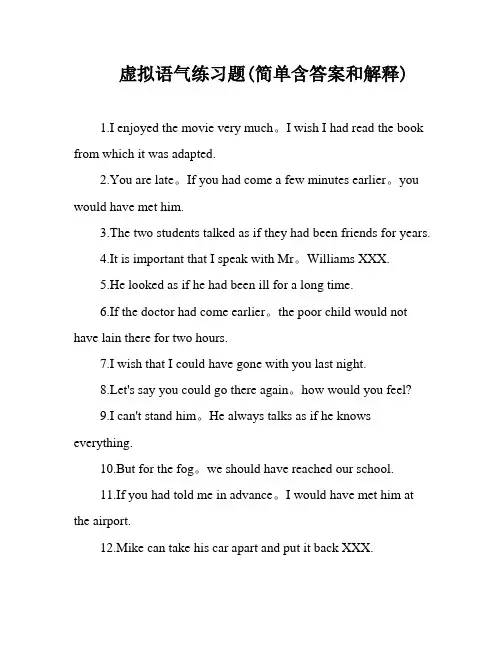
虚拟语气练习题(简单含答案和解释)1.I enjoyed the movie very much。
I wish I had read the book from which it was adapted.2.You are late。
If you had come a few minutes earlier。
you would have met him.3.The two students talked as if they had been friends for years.4.It is important that I speak with Mr。
Williams XXX.5.He looked as if he had been ill for a long time.6.If the doctor had come earlier。
the poor child would not have lain there for two hours.7.I wish that I could have gone with you last night.8.Let's say you could go there again。
how would you feel?9.I can't stand him。
He always talks as if he knows everything.10.But for the fog。
we should have reached our school.11.If you had told me in advance。
I would have met him at the airport.12.Mike can take his car apart and put it back XXX.13.I would have told him the answer had it been possible。
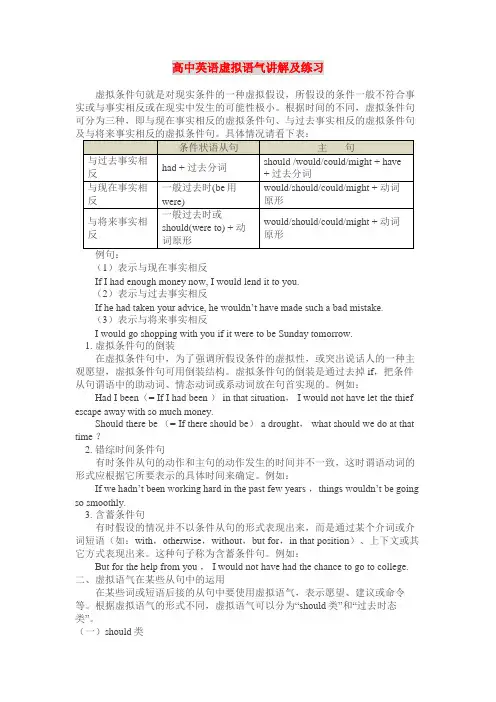
高中英语虚拟语气讲解及练习虚拟条件句就是对现实条件的一种虚拟假设,所假设的条件一般不符合事实或与事实相反或在现实中发生的可能性极小。
根据时间的不同,虚拟条件句可分为三种,即与现在事实相反的虚拟条件句、与过去事实相反的虚拟条件句(1)表示与现在事实相反If I had enough money now, I would lend it to you.(2)表示与过去事实相反If he had taken your advice, he wouldn’t have made such a bad mistake.(3)表示与将来事实相反I would go shopping with you if it were to be Sunday tomorrow.1. 虚拟条件句的倒装在虚拟条件句中,为了强调所假设条件的虚拟性,或突出说话人的一种主观愿望,虚拟条件句可用倒装结构。
虚拟条件句的倒装是通过去掉if,把条件从句谓语中的助动词、情态动词或系动词放在句首实现的。
例如:Had I been(= If I had been ) in that situation, I would not have let the thief escape away with so much money.Should there be (= If there should be) a drought, what should we do at that time ?2. 错综时间条件句有时条件从句的动作和主句的动作发生的时间并不一致,这时谓语动词的形式应根据它所要表示的具体时间来确定。
例如:If we hadn’t been working hard in the past few years ,thing s wouldn’t be going so smoothly.3. 含蓄条件句有时假设的情况并不以条件从句的形式表现出来,而是通过某个介词或介词短语(如:with,otherwise,without,but for,in that position)、上下文或其它方式表现出来。
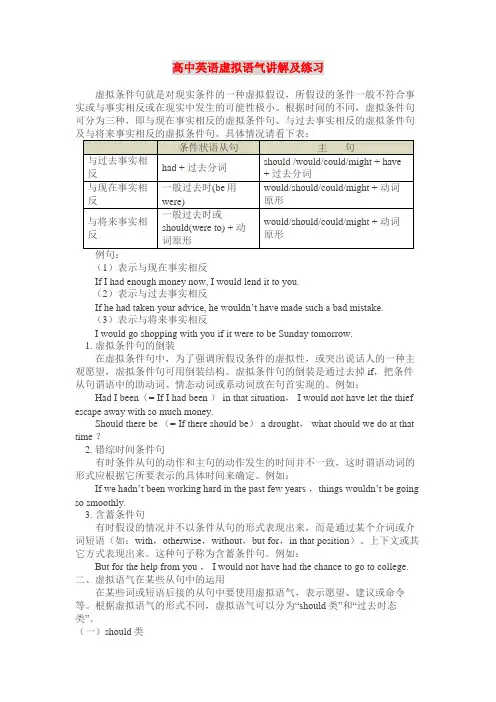
高中英语虚拟语气讲解及练习虚拟条件句就是对现实条件的一种虚拟假设,所假设的条件一般不符合事实或与事实相反或在现实中发生的可能性极小。
根据时间的不同,虚拟条件句可分为三种,即与现在事实相反的虚拟条件句、与过去事实相反的虚拟条件句(1)表示与现在事实相反If I had enough money now, I would lend it to you.(2)表示与过去事实相反If he had taken your advice, he wouldn’t have made such a bad mistake.(3)表示与将来事实相反I would go shopping with you if it were to be Sunday tomorrow.1. 虚拟条件句的倒装在虚拟条件句中,为了强调所假设条件的虚拟性,或突出说话人的一种主观愿望,虚拟条件句可用倒装结构。
虚拟条件句的倒装是通过去掉if,把条件从句谓语中的助动词、情态动词或系动词放在句首实现的。
例如:Had I been(= If I had been ) in that situation, I would not have let the thief escape away with so much money.Should there be (= If there should be) a drought, what should we do at that time ?2. 错综时间条件句有时条件从句的动作和主句的动作发生的时间并不一致,这时谓语动词的形式应根据它所要表示的具体时间来确定。
例如:If we hadn’t been working hard in the past few years ,thing s wouldn’t be going so smoothly.3. 含蓄条件句有时假设的情况并不以条件从句的形式表现出来,而是通过某个介词或介词短语(如:with,otherwise,without,but for,in that position)、上下文或其它方式表现出来。
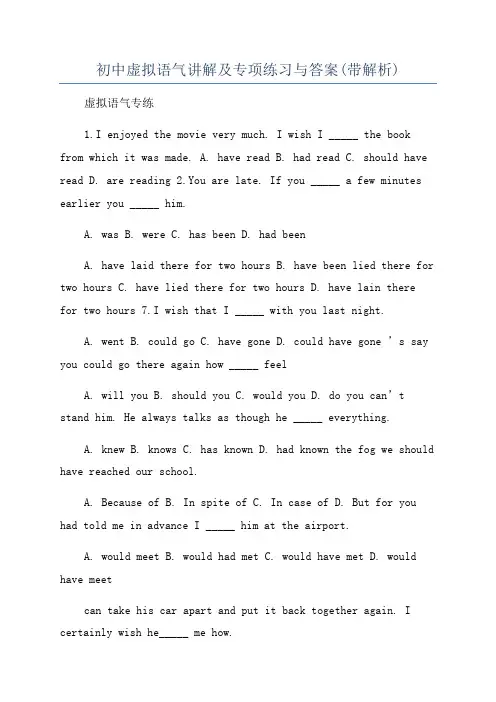
初中虚拟语气讲解及专项练习与答案(带解析)虚拟语气专练1.I enjoyed the movie very much. I wish I _____ the book from which it was made. A. have read B. had read C. should have read D. are reading2.You are late. If you _____ a few minutes earlier you _____ him.A. wasB. wereC. has beenD. had beenA. have laid there for two hoursB. have been lied there for two hoursC. have lied there for two hoursD. have lain therefor two hours 7.I wish that I _____ with you last night.A. wentB. could goC. have goneD. could have gone ’s say you could go there again how _____ feelA. will youB. should youC. would youD. do you can’t stand him. He always talks as though he _____ everything.A. knewB. knowsC. has knownD. had known the fog we should have reached our school.A. Because ofB. In spite ofC. In case ofD. But for you had told me in advance I _____ him at the airport.A. would meetB. would had metC. would have metD. would have meetcan take his car apart and put it back together again. I certainly wish he_____ me how.A. teachesB. will teachC. has taughtD. would teachwould have told him the answer had it been possible but I_____ so busy then.A. had beenB. wereC. wasD. would be ’s working hard for fear that he _____.A. should fall behindB. fell behindC. may fall behindD. would fallen behind 15.If it _____ another ten minutes the game would have been called off.A. had rainedB. would have rainedC. have seenD. rained suggested that they _____ use a trick instead of fighting.A. ShouldB. wouldC. doD. hadfather did not go to New York the doctor suggested that he _____ there.A. had hadB. have hadC. hadD. would have had you rather I _____ buying a new bikeA. decided againstB. will decide againstC. have decidedD. shall decide againstA. go to sleepB. went to sleepC. go to bedD. went to bed21.—Why didn’t you buy a new car —I would have bought one if I _____ enough money.A. hadB. have hadC. would haveD. had had she could sew _____.A. she make a dressB. she would have made a shirtC. she will make a shirtD. she would had made a coat today he would get there by Friday.A. Would he leaveB. Was he leavingC. Were he to leaveD. If he leaves doctor suggested that he _____ a short trip abroad.A. will takeB. would takeC. takeD. tookBakers arrived las t night. If they’d only let us know earlier_____ at the station.A. we’d meet themB. we’ll meet themC. we’d have met themD. we’ve met themI _____ you I _____ more attention to English idioms and phrases.A. was shall payB. am will payC. would be would payD. were would pay might have failed if you _____ us a helping hand.A. have not givenB. would not giveC. had not givenD. did not give law requires that everyone _____ his car checked at least once a year.A. hasB. hadC. haveD. will have is strange that he _____ so.A. would sayB. would speakC. should sayD. will speak I known her name _____A. or does she know mineB. and where does she liveC. she would be beautiful.D. I would have invited her to lunch. 31.He has just arrived but he talks as if he _____ all about that. A. know B. knows C. known D. knew32.If I _____ the money I would have bought a much bigger car.A. possessedB. ownedC. hadD. had had33.He was very busy yesterday otherwise he _____ to the meeting.librarian insists that John _____ no more books from the library before he returns all the books he has borrowed.A. will takeB. tookC. takeD. takes35.I left very early last night but I wish I _____ so early.A. hadB. didn’t haveC. had hadD. havewish that you _____ suc h a bad headache because I’m sure that you would have enjoyed the concert.A. hadn’tB. didn’t have hadC. hadn’t hadD. hadn’t have insisted that we all _____ in his office at one o’clock.A. beB. to beC. would beD. shall becouldn’t go to France after all. That’s too bad. I’m sure she would have enjoyed it if _____.A. she’s goneB. she’ll goC. she’d goneD. she’d gomust go there earlier. John has suggested that I _____ an hour before the discussion begins.A. goB. shall goC. will goD. would go英语虚拟语气讲解语气 (mood) 是一种动词形式,用以表示说话者的意图或态度。
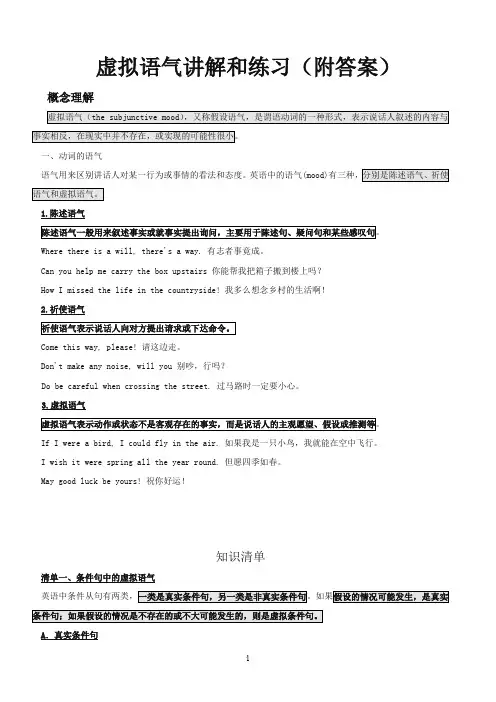
虚拟语气讲解和练习(附答案)概念理解一、动词的语气语气用来区别讲话人对某一行为或事情的看法和态度。
英语中的语气(mood)1.陈述语气Where there is a will, there's a way. 有志者事竟成。
Can you help me carry the box upstairs 你能帮我把箱子搬到楼上吗?How I missed the life in the countryside! 我多么想念乡村的生活啊!2.祈使语气Come this way, please! 请这边走。
Don't make any noise, will you 别吵,行吗?Do be careful when crossing the street. 过马路时一定要小心。
3.虚拟语气If I were a bird, I could fly in the air. 如果我是一只小鸟,我就能在空中飞行。
I wish it were spring all the year round. 但愿四季如春。
May good luck be yours! 祝你好运!知识清单清单一、条件句中的虚拟语气A.真实条件句If he doesn't come at 8, we won't wait for him. 如果他八点不来,我们就不等他了。
If a flood happened in the past, there was usually a great loss of life and property. 过去发生洪水的话,常有很大的生命和财产损失。
We shall go there unless it rains tomorrow. 如果明天不下雨,我们将去那里。
I'll let you use my bike on condition that you keep it clean. 如果你能保持车子干净,我就让你用我的自行车。
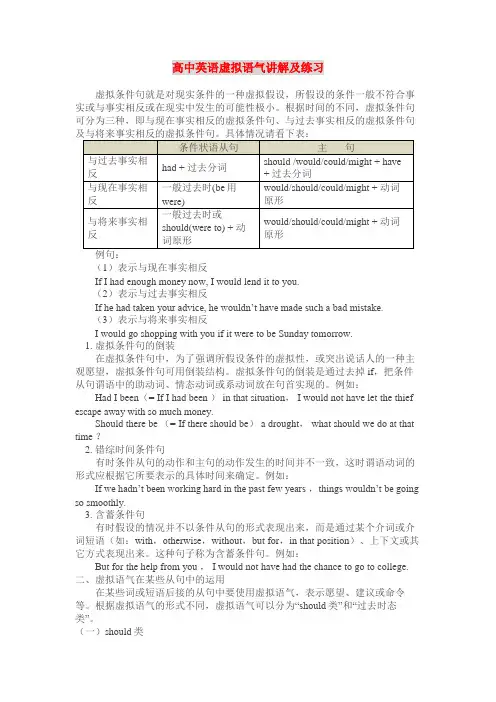
高中英语虚拟语气讲解及练习虚拟条件句就是对现实条件的一种虚拟假设,所假设的条件一般不符合事实或与事实相反或在现实中发生的可能性极小。
根据时间的不同,虚拟条件句可分为三种,即与现在事实相反的虚拟条件句、与过去事实相反的虚拟条件句(1)表示与现在事实相反If I had enough money now, I would lend it to you.(2)表示与过去事实相反If he had taken your advice, he wouldn’t have made such a bad mistake.(3)表示与将来事实相反I would go shopping with you if it were to be Sunday tomorrow.1. 虚拟条件句的倒装在虚拟条件句中,为了强调所假设条件的虚拟性,或突出说话人的一种主观愿望,虚拟条件句可用倒装结构。
虚拟条件句的倒装是通过去掉if,把条件从句谓语中的助动词、情态动词或系动词放在句首实现的。
例如:Had I been(= If I had been ) in that situation, I would not have let the thief escape away with so much money.Should there be (= If there should be) a drought, what should we do at that time ?2. 错综时间条件句有时条件从句的动作和主句的动作发生的时间并不一致,这时谓语动词的形式应根据它所要表示的具体时间来确定。
例如:If we hadn’t been working hard in the past few years ,thing s wouldn’t be going so smoothly.3. 含蓄条件句有时假设的情况并不以条件从句的形式表现出来,而是通过某个介词或介词短语(如:with,otherwise,without,but for,in that position)、上下文或其它方式表现出来。
虚拟语气一、考点聚焦1、虚拟语气用于条件状语从句中(1)表示与现在事实相反的假设,条件状语从句中的谓语动词用“过去式(be动词的过去式用were)”,而主句中的谓语动词用“would / should/ could / might + 动词原形”。
如:If I were a boy, I would join the army.If the had time, she should go with you.(2)表示与过去的事实相反,条件状语从句中的谓语动词用过去完成时,主句中的谓语动词则用“would / should / might / could + have +过去分词”。
如:If he had taken my advice, he would have succeeded in the competition.(3)表示与将来事实相反,条件状语从句中的谓语动词一般过去时或should(were to) + 动词原形,而主句中的谓语动词则用would / should/could might + 动词原形。
如;If it were to rain tomorrow, the football match would be put off.(4)当条件状语从句表示的行为和主句表示的行为所发生的时间不一致时,动词的形式要根据它所表示的时间作相应调整。
如:If they had worked hard, they would be very tired.(从句说的是过去,主句指的是现在)Were I a boy, I would join the army.Had he taken my advice, he would have succeeded.Were it not for the expense, I would go to Britain.2、虚拟语气用于名词性从句(1)虚拟语气在宾语从句中的运用。
高中英语虚拟语气讲解及练习虚拟条件句就是对现实条件的一种虚拟假设,所假设的条件一般不符合事实或与事实相反或在现实中发生的可能性极小。
根据时间的不同,虚拟条件句可分为三种,即与现在事实相反的虚拟条件句、与过去事实相反的虚拟条件句(1)表示与现在事实相反If I had enough money now, I would lend it to you.(2)表示与过去事实相反If he had taken your advice, he wouldn’t have made such a bad mistake.(3)表示与将来事实相反I would go shopping with you if it were to be Sunday tomorrow.1. 虚拟条件句的倒装在虚拟条件句中,为了强调所假设条件的虚拟性,或突出说话人的一种主观愿望,虚拟条件句可用倒装结构。
虚拟条件句的倒装是通过去掉if,把条件从句谓语中的助动词、情态动词或系动词放在句首实现的。
例如:Had I been(= If I had been ) in that situation, I would not have let the thief escape away with so much money.Should there be (= If there should be) a drought, what should we do at that time ?2. 错综时间条件句有时条件从句的动作和主句的动作发生的时间并不一致,这时谓语动词的形式应根据它所要表示的具体时间来确定。
例如:If we hadn’t been working hard in the past few years ,thing s wouldn’t be going so smoothly.3. 含蓄条件句有时假设的情况并不以条件从句的形式表现出来,而是通过某个介词或介词短语(如:with,otherwise,without,but for,in that position)、上下文或其它方式表现出来。
虚拟语气练习题及答案详解
哎呀,今天给大家带来的是虚拟语气练习题及答案详解,这可是
英语学习中的重头戏啊!咱们先来个热身,看看下面的句子,你能判
断出它是什么语气吗?
1. 我要是能去巴黎,那该多好啊!
这个句子,咱们先别急着看答案,咱们来分析分析。
这句话里的“要是”就是一个关键词,它表示一种假设,不是真的去巴黎,而是
想象一下。
所以,这个句子就是虚拟语气。
好,那答案揭晓:这个句子是表示与现在事实相反的虚拟语气。
接下来,咱们再来几个练习题,看看你的掌握程度如何。
2. 要是明天不下雨,我们就去公园玩。
这个句子,咱们来分析一下。
同样是“要是”,表示假设,但是
后面的“明天不下雨”和“我们去公园玩”是顺承关系,所以这是一
个表示与将来事实相反的虚拟语气。
答案:表示与将来事实相反的虚拟语气。
3. 我多么希望你能来参加我的生日派对啊!
这个句子,咱们来分析一下。
这里的“多么希望”是一个关键词,表示一种强烈的愿望,所以这是一个表示与过去事实相反的虚拟语气。
答案:表示与过去事实相反的虚拟语气。
好啦,今天的练习就到这里。
希望你们通过这些练习,对虚拟语
气有了更深入的了解。
记住,虚拟语气在英语表达中可是非常重要的,平时多加练习,相信你们都能掌握得很好!加油哦!。
(完整版)虚拟语气讲解及练习题(含答案和解释)虚拟语气讲解与练习黄志刚2013.10.一. 简介虚拟语气用来表示说话人的主观愿望或假想,而不表示客观存在的事实,所说的是一个条件,不一定是事实,或与事实相反。
虚拟语气通过谓语动词的特殊形式来表示。
英语中的语气分为陈述语气、祈使语气、虚拟语气在什么情况下用虚拟语气? 在表示虚假的、与事实相反的或难以实现的情况时用虚拟语气,表示主观愿望或表示某种强烈情感时,也用虚拟语气。
即当一个人说话时欲强调其所说的话是基于自己的主观想法,而不是根据客观实际,就用虚拟语气。
二. 虚拟语气在非真实条件状语从句中的用法1、真实条件状语从句与非真实条件状语从句真:eg . If he doesn’t hurry up, he will miss the bus. 如果他不快点,他将错过巴士。
( 真实条件状语)(不是虚拟语气)If he is free, he will ask me to tell stories. 如果他是空闲的,他会要求我讲故事。
(真实条件状语)(不是虚拟语气)非真:eg. If I were you, I would go at once.如果我是你,我马上就会去。
(非真实条件状语从句)If there were no air, people would die. 如果没有空气,人就会死亡。
(非真实条件状语从句)2、用法及动词形式1、表示与现在事实相反的情况,例1.If I were you, I would take an umbrella.如果我是你,我会带把伞。
(事实:我不可能是你) 2.If I knew his telephone number, I would tell you. 如果我知道他的电话号码,我就会告诉你。
(事实:不知道) 3.If there were no air orwater, there would be no living things on the earth. 如果没有水和空气,地球上就不会有生物。
高中英语虚拟语气讲解及练习虚拟条件句就是对现实条件的一种虚拟假设,所假设的条件一般不符合事实或与事实相反或在现实中发生的可能性极小。
根据时间的不同,虚拟条件句可分为三种,即与现在事实相反的虚拟条件句、与过去事实相反的虚拟条件句(1)表示与现在事实相反If I had enough money now, I would lend it to you.(2)表示与过去事实相反If he had taken your advice, he wouldn’t have made such a bad mistake.(3)表示与将来事实相反I would go shopping with you if it were to be Sunday tomorrow.1. 虚拟条件句的倒装在虚拟条件句中,为了强调所假设条件的虚拟性,或突出说话人的一种主观愿望,虚拟条件句可用倒装结构。
虚拟条件句的倒装是通过去掉if,把条件从句谓语中的助动词、情态动词或系动词放在句首实现的。
例如:Had I been(= If I had been ) in that situation, I would not have let the thief escape away with so much money.Should there be (= If there should be) a drought, what should we do at that time ?2. 错综时间条件句有时条件从句的动作和主句的动作发生的时间并不一致,这时谓语动词的形式应根据它所要表示的具体时间来确定。
例如:If we hadn’t been working hard in the past few years ,thing s wouldn’t be going so smoothly.3. 含蓄条件句有时假设的情况并不以条件从句的形式表现出来,而是通过某个介词或介词短语(如:with,otherwise,without,but for,in that position)、上下文或其它方式表现出来。
高中英语虚拟语气讲解及练习虚拟条件句就是对现实条件的一种虚拟假设,所假设的条件一般不符合事实或与事实相反或在现实中发生的可能性极小。
根据时间的不同,虚拟条件句可分为三种,即与现在事实相反的虚拟条件句、与过去事实相反的虚拟条件句(1)表示与现在事实相反If I had enough money now, I would lend it to you.(2)表示与过去事实相反If he had taken your advice, he wouldn’t have made such a bad mistake.(3)表示与将来事实相反I would go shopping with you if it were to be Sunday tomorrow.1. 虚拟条件句的倒装在虚拟条件句中,为了强调所假设条件的虚拟性,或突出说话人的一种主观愿望,虚拟条件句可用倒装结构。
虚拟条件句的倒装是通过去掉if,把条件从句谓语中的助动词、情态动词或系动词放在句首实现的。
例如:Had I been(= If I had been ) in that situation, I would not have let the thief escape away with so much money.Should there be (= If there should be) a drought, what should we do at that time ?2. 错综时间条件句有时条件从句的动作和主句的动作发生的时间并不一致,这时谓语动词的形式应根据它所要表示的具体时间来确定。
例如:If we hadn’t been working hard in the past few years ,thing s wouldn’t be going so smoothly.3. 含蓄条件句有时假设的情况并不以条件从句的形式表现出来,而是通过某个介词或介词短语(如:with,otherwise,without,but for,in that position)、上下文或其它方式表现出来。
虚拟语气讲解和练习(附答案)概念理解一、动词的语气语气用来区别讲话人对某一行为或事情的看法和态度。
英语中的语气(mood)1.陈述语气Where there is a will, there's a way. 有志者事竟成。
Can you help me carry the box upstairs 你能帮我把箱子搬到楼上吗?How I missed the life in the countryside! 我多么想念乡村的生活啊!2.祈使语气Come this way, please! 请这边走。
Don't make any noise, will you 别吵,行吗?Do be careful when crossing the street. 过马路时一定要小心。
3.虚拟语气If I were a bird, I could fly in the air. 如果我是一只小鸟,我就能在空中飞行。
I wish it were spring all the year round. 但愿四季如春。
May good luck be yours! 祝你好运!知识清单清单一、条件句中的虚拟语气A.真实条件句If he doesn't come at 8, we won't wait for him. 如果他八点不来,我们就不等他了。
If a flood happened in the past, there was usually a great loss of life and property. 过去发生洪水的话,常有很大的生命和财产损失。
We shall go there unless it rains tomorrow. 如果明天不下雨,我们将去那里。
I'll let you use my bike on condition that you keep it clean. 如果你能保持车子干净,我就让你用我的自行车。
B.非真实条件句与现在事实相反if条件句的谓语:were / did 主句的谓语:would (could/should/might) + do与过去事实相反if条件句的谓语:had done 主句的谓:would (could/should/might) + have done与将来事实相反if条件句的谓语:did/were 主句的谓:should (would /could/might/ were to) + do基本规律:1.表示与现在事实相反的条件。
would、could、might存在词义上的区别。
If it were Sunday tomorrow, I would go and see my friends. 明天要是星期天的话,我就去看望我的朋友。
If I were you, I should go and try. 我要是你,我就去试试。
If wishes were horses, beggars might ride. 如果幻想能成为马匹,叫花子都有了坐骑2.表示与过去事实相反的条件If I had known your telephone number yesterday, I would have telephoned you. 如果昨天我知道你的电话号码,我就给你打电话了。
If it had not rained this morning, I should have gone shopping. 今天早上要是没下雨,我就去买东西了。
The flood might have caused great damages to the people if we had not built so many reservoirs. 倘若我们没有修建这么多的水库,洪水就会使人民遭受巨大的损失。
3.表示在将来不太可能实现的条件: 条件从句有三种形式:①were/didIf he were here tomorrow, I would speak to him. 明天如果他在这里的话,我就和他谈谈。
If you dropped the glass, it would break. 你要是把杯子掉下来,会打碎的。
If she had time, she could help me. 她要是有时间,就会帮我了。
②should do条件从句中不管什么人称都用If it should rain, the crops could be saved. 假如下雨,庄稼可能就有救了。
We would trust him if he should be honest. 如果他真是诚实的,那我们就相信他。
③were to do条件从句用If I were to do the work, I should do it in a different way. 要是我做这项工作,我就会以不同的方式去做。
If the headmaster were to come, what would we say to him 假如校长来了,我们对他说什么呢?对比:将来不太可能实现的三种非真实条件句中的虚拟语气对比If it snowed tomorrow, I would stay at home. 如果明天下雪的话,我就留在家里。
(常用形式)If it should snow tomorrow, I would stay at home. 如果明天下雪的话,我就留在家里。
(可能性较小)If it were to snow tomorrow, I would stay at home. 如果明天要下雪的话,我就留在家里。
(可能性最小)用倒装结构。
Were it necessary, I might go without delay. 如果需要的话,我可以立即去。
(= If it were necessary......)Had you taken my advice, you wouldn't have failed in the exam. 你要是听了我的建议,就不会考试不及格了。
(= If you had taken my advice......)Should I have time, I would call on her. 要是有时间,我就去看她。
(= If I should have time......)If you hadn't watched TV yesterday, you wouldn't be so sleepy now.如果你昨天不看电视,你现在也就不会这么困了。
(从句yesterday说明过去,主句now说明现在)If they had left home early this morning, they would arrive in half an hour. 如果他们今天一早就离开家的话,再过半小时他们就该到了。
(从句说明过去,主句说明将来。
)If you hesitated this moment, you might suffer in the future.如果你此刻犹豫不决,你将来会吃苦头的。
(从句说明现在,主句说明将来)注意:在很多情况下,我们也可以用was来代替当主语是第一人称或第三人称单数时的were。
If were here tomorrow...也可以说成:If he was here tomorrow...E.含蓄条件句非真实条件句中的条件从句有时不表达出来,只暗含在上下文中,这种句子叫做含蓄条件句。
含蓄条件句大体有三种情况:1He would not get such a result without your help. 没有你的帮助,他就不会有今天的成果。
(条件暗含在介词短语without your help中)But for you, I could not be recovered so soon. 要不是有你,我就不会恢复得这么快。
(条件暗含在But for you 中)2It would do you no good. 这可能会对你没好处。
(条件可能是if you should give up the job 如果你放弃这项工作的话)They could have won.他们本来是会赢的。
(条件可能是if they had been patient 如果他们有耐心的话) Such mistakes could have been avoided. 这种错误完全能避免。
(条件可能是if you had been more careful 如果你更加小心一点的话)Why didn't you tell me about it I should have helped you.为什么你不告诉我?我会帮助你的。
(条件可能是if you had told me about it 如果你当时告诉我的话)--- Did you go to see him yesterday你昨天去看他了吗?--- I would have, but someone dropped over to my house for a visit.原想去的,但有人到我家来玩了。
(条件是if no one had dropped over to my house for a visit 如果没人到我家来玩的话)3She was ill, otherwise she would have been present at the meeting. 她病了,否则的话就会出席会议了。
(条件通过连词otherwise/or表示出来If she had not been ill...)Suppose you were in my shoes, what would you do 假若你站在我的立场上,你会怎么办?(用suppose/supposing/providing等词表示if)清单二、虚拟语气在各种从句中的用法虚拟语气除主要用于非真实条件句外,还可用在部分主语从句、宾语从句、表语从句、同位语从句、定语从句和状语从句之中。
should,只用动词原形)。
It is important that we (should) work out a study plan. 重要的是我们要制订出一个学习计划。
It will be better that we (should) meet some other time. 最好我们在另一个时间见面。
It is suggested that each student (should) sing a song in English. 有人建议每个学生都要唱一首英文歌曲。